You could say they’re compassionate but fed up.
On the afternoon of July 21, Athena Kaskey and Liza Kelly sat on a front porch in West Asheville and described the trash, feces, syringe litter, thefts and trespassing their respective families have dealt with in recent years.
Both women, who are next-door neighbors, moved to their neighborhood in 2015. Before COVID-19, they say, the homeless people in the area were familiar faces. But more recently, that’s been less true — and some of the people they see on the street are acting aggressively. Kelly says she’s been chased, and Kaskey says someone threw a rock at her.
There are no public bathroom facilities in West Asheville, and Kaskey describes a recent smell outside as “horrific.” Kelly echoed that concern: “It was really bad yesterday with all the rain. I was out in the driveway, and it smelled like a port-a-potty minus the chemicals.”
Meanwhile, drug use in the area is “off the charts,” Kaskey maintains. She says she regularly collects used needles from her lawn, and she remembers picking up 10 in a single day.
The two neighbors say they’ve repeatedly contacted the Police Department about the drug use, trespassing and property damage. Kaskey recalls the time several strangers ripped branches off her maple trees. Her son called her to his bedroom window and said, “There’s this guy with his shirt off swinging a 6-foot branch in our yard!” She says she informed the man that children live in her home and he “was kind enough to move on.”
Kelly says she’s filed service requests in every single category on the Asheville App, which the city encourages residents to use to report a wide variety of concerns. In 2022 alone, she reported issues ranging from needle litter to someone cursing at her in front of her children. And while Kelly says city representatives did respond “in a timely manner,” the problems persist.
Forgive us our trespasses
That same afternoon, the police were summoned to Trinity United Methodist Church, which sits nearby. APD spokesperson Samantha Booth says a neighbor called to report a suspicious person who appeared to be trespassing on Trinity’s property, but the officers weren’t able to locate the person. The same thing happened the next day. Police returned a third time on July 23, found two people on church property and warned them about trespassing.
Since 2022, the church has had a “no trespassing” letter on file with the APD covering the hours from dusk to dawn. Normally, that would enable responding officers to issue a citation or arrest the trespasser. But because church staff members “have verbally allowed certain people permission to be there,” and the APD doesn’t have a written list of people allowed on the property, it’s hard to enforce the letter, Booth explains, adding that this scenario has played out at the church “a slew of times.”
Trinity staff members have a somewhat different perspective, however. “The land at 587 Haywood Road is Sanctuary for all God’s children,” the Rev. Nancy Dixon Walton and Dustin Mailman, the pastor of family ministries and missions, wrote in a recent email to Xpress. They also noted that according to the 1847 deed, the property was donated “for the benefit of the neighborhood.”
A difficult balance
Since mid-June, people haven’t been allowed on the church property. Trinity had previously allowed “everyone a place on the front side of the property, facing Haywood Road, to rest in the shade, reorganize their backpacks and/or spend a few moments of quiet” during daytime hours, the pastors’ email explains. The pair stress that they welcome service providers such as Buncombe County’s community paramedics and offer pastoral care to anyone who seeks it.
But the church has now asked people to stay off the property “due to an increased amount of vandalism and presence of trash,” the email notes, making the “no trespassing” letter enforceable at all hours. The pastors note that they communicate with the police regularly, and “They said they would offer an increased presence.”
When asked about the three consecutive police visits, both pastors said they weren’t aware of any incidents on the property or of any church representative asking for assistance.
The pastors acknowledge that they often face frustrated visitors and neighbors, but they believe that their spiritual mission transcends those concerns. “We are called to offer a moral consciousness to the challenges of our community. We feel called to stand in this tension of caring for our housed and unhoused neighbors.” Instead, their goals are to “make sure we do no harm to any guest within Sanctuary, we are doing good, and that our relationship with God is alive and loving.”
Serving folks in need
On Tuesday afternoons, The Steady Collective, which is registered with the N.C. Department of Health and Human Services, parks its vehicle at 610 Haywood Road. Since 2016, state law has allowed such programs to distribute sterile syringes to any member of the community, to safely dispose of used syringes, to provide naloxone (an overdose reversal drug) to anyone who asks for it and to offer referrals to facilities providing mental health and addiction treatment.

Some neighbors and business owners maintain that distributing free syringes brings people who use drugs to the neighborhood, resulting in more discarded needles. In an emailed response, Steady Collective members wrote, “Harm reduction is still a very polarized issue, so often the loudest voices we hear are those that are upset about the work that we do.” However, they underscore their own commitment to ensuring clients’ health and safety by providing needed services.
“Fear of police interaction by people who use drugs and participate in syringe exchange programs can lead to lower rates of used-syringe return and thus increased needle litter,” their emailed statement continued. “It can also lead to less engagement with safer-use services in general, which can lead to higher rates of blood-borne pathogens and disruptions of housing and job security due to detainment.”
Pointing out that any community member, including businesses, can schedule pickups of any amount of needle litter, the statement added, “We also care about the greater communities that we operate in and are receptive to constructive feedback.”
Harsh words and limited resources
From his business, Local 604 Bottle Shop on Haywood Road, Jamie Howton has a front-row seat to the problems in the area. In the course of a roughly half-hour interview in his shop on a recent Wednesday afternoon, this reporter saw three people standing on Balm Grove Avenue lift up their shirts and inject one another in the back with orange needles.
Like the business’s residential neighbors, Howton says he regularly picks up needle litter. He also calls the APD for assistance when he sees people trespassing, often in connection with drug use, but he doesn’t always get a response. “I don’t think they have the resources,” says Howton, adding, “We’re kind of on our own.”
That means Howton sometimes has to tell people who are using drugs in his doorway or behind his shop to leave. “It’s always an aggressive exchange,” he says, describing the cavalcade of F-bombs he hears in those situations.
Howton has found one strategy that works, though. “All I have to do is say, ‘Hey, you’re on video right here.’ And even if they talk s—, telling me to f— off, they leave because they don’t want to be on video.”
He clearly sees a need for more services in the neighborhood, however.
“We need 24-hour public bathrooms,” Howton declares. “We need a water fountain so people can fill up their water bottles. Those are the things that would benefit the homeless a lot. And they hopefully benefit me, too, because they would have a bathroom to go into instead of go into the doorway.”
No easy answers
These problems aren’t limited to West Asheville. On Aug. 10, five elected officials — Mayor Esther Manheimer, Vice Mayor Sandra Kilgore and City Council members Sheneika Smith, Sage Turner and Maggie Ullman — released a public letter spelling out a multipronged approach to addressing concerns about public safety and related issues. Five days later, Council member Kim Roney responded with her own public letter detailing a somewhat different vision of how the city should proceed.
The Aug. 10 letter also referenced a 60-day downtown safety initiative that was rolled out in late April. It included a more visible police presence, sanitation services in parks, improved street lighting and security cameras in parking garages. Another component, the Fire Department’s community responder pilot program, sent firefighters to talk with business owners and people on the street, and to refer those who were homeless or in crisis to the appropriate resources.
During a July 14 Downtown Commission meeting, Assistant City Manager Rachel Wood said that some of those services will now be ongoing. More recently, city spokesperson Kim Miller noted that services such as the community responder program are extending their reach into other neighborhoods. The program’s public portal shows most of the West Asheville responses clustered along Haywood Road, particularly around Dorchester, Balm Grove and Martin avenues.
Howton says that someone from the program did come by his shop and ask if he could identify any of the trespassers by name so that responders could speak to them about their behavior, but he says there’s only one man he recognizes.
Like their downtown counterparts, many West Asheville business owners and residents have experienced problems related to homelessness and drug use. Some feel frustrated by seeing people sleeping in doorways, trespassing and leaving trash and used syringes behind. Others say that homeless folks and those with substance use issues aren’t being adequately served by the existing systems, and these vulnerable people need all the help they can get.
Many residents say they recognize that addiction is not a crime, yet they’re unsure where to turn for help. “This has been our moral dilemma, because we don’t think it’s fair that people get [punished] because of how bad the system is,” Kaskey explains, adding, “We just want a solution.”
While Xpress was interviewing the two neighbors, Kelly’s children frolicked in a kiddie pool, their joyful shrieks periodically interrupting the somber conversation. But as Kelly pointed out, “They’ve seen a lot more than we want them to see.”




